Programmed and Projected by Julian Antos, Becca Hall, Rebecca Lyon, Kyle Westphal, and Cameron Worden. Additional capsules by Gabriel Wallace. Research Associate: Mike Quintero
Our screenings are held at multiple venues around Chicago, including:
- The Auditorium at Northeastern Illinois University (inside of Building E)
3701 W. Bryn Mawr Ave., Chicago, IL 60625 — Directions • Campus Map
Tickets: General Admission: $7 • NEIU Students: $3
- The Music Box Theatre
3733 N. Southport Ave., Chicago, IL 60613 — Directions • Parking
Tickets: $10 or $11
- Chicago Filmmakers
5720 N Ridge Ave., Chicago, IL 60660 — Directions • Parking
Tickets: $8
Monday, September 3 @ 7:00 PM / Music Box Theatre
THE SMALLEST SHOW ON EARTH
Directed by Basil Dearden • 1957
This British gem about a young co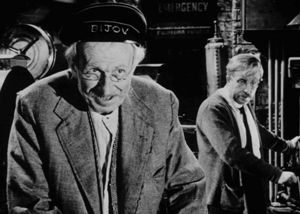 uple (Virginia McKenna and Bill Travers) who inherit a movie theater is strangely underseen considering how much cinema-dwellers love to see themselves on screen. Upon discovering they are not the proud new owners of the Grand (a sparkling modern cinema spied from their taxi window) but of a nearby derelict gothic dump the locals call “the fleapit,” the pair reluctantly decide to reopen said dump after their lawyer convinces them it may push the Grand’s owner to buy them out. The staff of the fleapit is a bickering triad of fantastic character actors. Peter Sellers (Mr. Quill, projectionist), Margaret Rutherford (Mrs. Fazackalee, cashier), and Bernard Miles (Old Tom, usher) are living embodiments of the building itself—shabby, full of loose screws, and impossible not to adore. McKenna and Travers gamely succumb to the joys and pains of running a decrepit single screen: elaborate concessions sales schemes, customers who pay in pork chops, and the eternal problems of management vs. projection. (“My equipment’s more important than your rats!” is a classic grievance.) This love letter to movie houses and their occupants will be felt keenly by anyone who watched a multiplex go up around the corner from their local neighborhood cinema and wished that once, just once, it would mysteriously burn to the ground. (RL)
uple (Virginia McKenna and Bill Travers) who inherit a movie theater is strangely underseen considering how much cinema-dwellers love to see themselves on screen. Upon discovering they are not the proud new owners of the Grand (a sparkling modern cinema spied from their taxi window) but of a nearby derelict gothic dump the locals call “the fleapit,” the pair reluctantly decide to reopen said dump after their lawyer convinces them it may push the Grand’s owner to buy them out. The staff of the fleapit is a bickering triad of fantastic character actors. Peter Sellers (Mr. Quill, projectionist), Margaret Rutherford (Mrs. Fazackalee, cashier), and Bernard Miles (Old Tom, usher) are living embodiments of the building itself—shabby, full of loose screws, and impossible not to adore. McKenna and Travers gamely succumb to the joys and pains of running a decrepit single screen: elaborate concessions sales schemes, customers who pay in pork chops, and the eternal problems of management vs. projection. (“My equipment’s more important than your rats!” is a classic grievance.) This love letter to movie houses and their occupants will be felt keenly by anyone who watched a multiplex go up around the corner from their local neighborhood cinema and wished that once, just once, it would mysteriously burn to the ground. (RL)
80 min • British Lion Films • 35mm from Pinewood Studios, imported by Rialto Pictures
Short: “Cinema Time Capsule” (Scott Norwood, 2013) – 5 min – 35mm
Saturday, September 8 @ 11:30 AM / Music Box Theatre
CITY GIRL
Directed by F.W. Murnau • 1930
Live accompaniment by Music Box house organist Dennis Scott
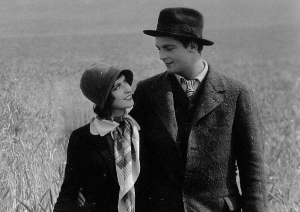 F.W. Murnau’s sojourn in Hollywood was brief, lasting for just three features, but in that span the Teutonic master of silent cinema managed to transform American movies. Sunrise was his landmark moment but his less-discussed American studio swan song City Girl, the warmest of his surviving films, deserves a place alongside his most beloved and long-canonized works. Evolving from a project initially conceived as a poetic paean to the production chain of bread, Murnau reconfigured his decidedly experimental concept into an endearingly simple love story between Minnesota country boy Lem (Charles Farrell), come to the big city to sell his family’s wheat crop, and Chicago waitress Kate (Mary Duncan), yearning for a new start and an end to the loneliness of urban life. Lem weds Kate and brings her home to the farm, but tensions arise with Lem’s family, who don’t look kindly upon Kate’s city girl ways. Filming his city scenes on extravagant studio sets and his farm scenes on location in the wilds of Oregon, Murnau imbues both with a blissful sense of discovery, collapsing simple urban-rural dichotomies and inventing the career of Terrence Malick in the process. Initially seen widely in an abbreviated, part-talkie version that most involved considered an embarrassment, Murnau’s original silent cut proves a wondrous thing, unspooling with the rapture of a rush through the wheat. (CW)
F.W. Murnau’s sojourn in Hollywood was brief, lasting for just three features, but in that span the Teutonic master of silent cinema managed to transform American movies. Sunrise was his landmark moment but his less-discussed American studio swan song City Girl, the warmest of his surviving films, deserves a place alongside his most beloved and long-canonized works. Evolving from a project initially conceived as a poetic paean to the production chain of bread, Murnau reconfigured his decidedly experimental concept into an endearingly simple love story between Minnesota country boy Lem (Charles Farrell), come to the big city to sell his family’s wheat crop, and Chicago waitress Kate (Mary Duncan), yearning for a new start and an end to the loneliness of urban life. Lem weds Kate and brings her home to the farm, but tensions arise with Lem’s family, who don’t look kindly upon Kate’s city girl ways. Filming his city scenes on extravagant studio sets and his farm scenes on location in the wilds of Oregon, Murnau imbues both with a blissful sense of discovery, collapsing simple urban-rural dichotomies and inventing the career of Terrence Malick in the process. Initially seen widely in an abbreviated, part-talkie version that most involved considered an embarrassment, Murnau’s original silent cut proves a wondrous thing, unspooling with the rapture of a rush through the wheat. (CW)
88 min • Fox Film Corp. • 35mm from Fox Library Services
Short: “[Untitled Home Movies]” (Joe Antos, Circa 1936) – 12 min – 16mm
Wednesday, September 12 @ 7:30 PM / NEIU
THE LOST ONE (DER VERLORENE)
Directed by Peter Lorre • 1951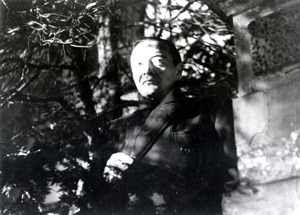
In German with English subtitles
After spending eighteen years in Hollywood with small parts in big movies like Casablanca and The Maltese Falcon and big parts in small movies like the eight-film Mr. Moto series, Peter Lorre returned to Germany, where he would cowrite and direct his only feature, The Lost One. An Austro-Hungarian Jew who fled the Nazis after delivering an iconic performance as a disturbed child molester in Fritz Lang’s M, Lorre was uniquely positioned to examine the horrors of recent German history. Lorre stars as Dr. Neumeister, a doctor working selflessly in a displaced persons camp in Hamburg. When reunited with a wartime acquaintance, Lorre flashes back to his days performing nefarious medical experiments for the Nazis. His disloyal fiancée (Renate Mannhardt) is his first victim, but far from the last. A contemporary of Joseph Losey’s unfairly maligned American remake of M, The Lost One is another gloss on Lang’s classic, continuing the tradition of using lurid crime stories to indict a whole society. Roundly rejected by German audiences conditioned to accept a new Allied order without recrimination, The Lost One did not receive an American release until 1983. (KW)
98 min • Arnold Pressburger Filmproduktion • 35mm from the Goethe-Institut, permission Beta Films
Short: TBA
Tuesday, September 18 @ 7:30 PM / NEIU
PRETTY POISON
Directed by Noel Black • 1968
Though cursed with a timid release from the 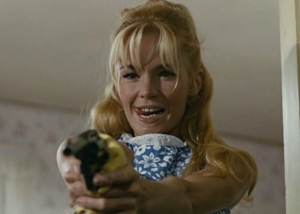 studio and poor box office numbers, Pretty Poison eventually seeped its way onto enough screens to become a cult favorite among those lucky enough to catch it. Director Noel Black wasn’t quite so fortunate however, being forever dogged by critics who claimed his subsequent films never quite lived up to his debut. Anthony Perkins stars as Dennis Pitt, a young man starting fresh after a long stint in a mental institution. After his parole officer lands him a steady job bottling mysterious candy-colored poisons at a chemical plant, he soon becomes smitten with the beautiful Sue Ann Stepenek, a local teenager played with frightful zeal by Tuesday Weld. Lucky for Dennis, batshit crazy is just Sue Ann’s type, but secret meetings at the local hot dog stand and his fake side-gig as a CIA operative can only hold her interest for so long before she suggests they up the ante. Perkins plays the role with an easy grace. He’s a Pan-like Clyde to Weld’s sociopathic Bonnie, and when their secret agent games turn violent it’s him we feel frightened for. It’s part bizarro Badlands and part environmental-horror film, with toxicity lurking beneath Sue Ann’s wholesome freckles and in the place that spawned her, as the chemical factory’s waste slowly leaches into the forests and rivers of small-town Western Massachusetts. There’s something in the water, and the kids are definitely not alright. (RL)
studio and poor box office numbers, Pretty Poison eventually seeped its way onto enough screens to become a cult favorite among those lucky enough to catch it. Director Noel Black wasn’t quite so fortunate however, being forever dogged by critics who claimed his subsequent films never quite lived up to his debut. Anthony Perkins stars as Dennis Pitt, a young man starting fresh after a long stint in a mental institution. After his parole officer lands him a steady job bottling mysterious candy-colored poisons at a chemical plant, he soon becomes smitten with the beautiful Sue Ann Stepenek, a local teenager played with frightful zeal by Tuesday Weld. Lucky for Dennis, batshit crazy is just Sue Ann’s type, but secret meetings at the local hot dog stand and his fake side-gig as a CIA operative can only hold her interest for so long before she suggests they up the ante. Perkins plays the role with an easy grace. He’s a Pan-like Clyde to Weld’s sociopathic Bonnie, and when their secret agent games turn violent it’s him we feel frightened for. It’s part bizarro Badlands and part environmental-horror film, with toxicity lurking beneath Sue Ann’s wholesome freckles and in the place that spawned her, as the chemical factory’s waste slowly leaches into the forests and rivers of small-town Western Massachusetts. There’s something in the water, and the kids are definitely not alright. (RL)
89 min • 20th Century-Fox • 35mm from Criterion Pictures, USA
Short: “Skaterdater” (Noel Black, 1966) – 17 min – 35mm, Preserved by the Academy Film Archive
Wednesday, September 26 @ 7:30 PM / NEIU
OTHER MEN’S WOMEN
Directed by William A. Wellman • 1931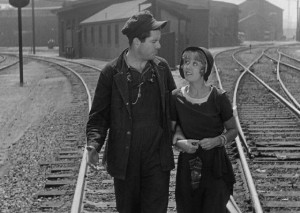
There’s no shortage of pre-Code films about penthouses and fancy negligees, but Other Men’s Women stands alone as a grubby slice of working class life. Grant Withers and Regis Toomey play two working stiff railroad engineers who wander the yards and hop their own boxcars with the panache of professional hoboes. Toomey has a wife (Mary Astor) in a little cottage in suburban Los Angeles, while Withers flirts with women at every station. (His steadiest lady friend is hash-slinger Joan Blondell, who proudly declares herself “A.P.O. – Ain’t Puttin’ Out.”) When Withers finds himself falling for Astor, the ancient order of male camaraderie collides headfirst with a modern colossus of steel. Overachiever James Cagney hoofs and hops in a bit part that set the stage for his breakthrough performance in The Public Enemy, another he-man Wellman collaboration released four months after Other Men’s Women. Routinely ignored in career overviews of Wellman, Blondell, and Cagney and long unavailable on 35mm, Other Men’s Women now emerges as an earthy, grease-caked delight: the characters are simple, the emotions are elemental, and the punches land like a sack of rocks With its freighted mix of forbidden love, railroad carnage, and retributive mutilation, it’s nothing less than the runty American nephew of Abel Gance’s La roue! (KW)
70 min • Warner Bros. • 35mm from Library of Congress
Short: “Railroading in the East: 1897-1906” (Blackhawk Films) – 10 min – 16mm
Wednesday, October 3 @ 7:30 PM / NEIU
MY LIFE AS A DOG • 1985
Directed by Lasse Hallström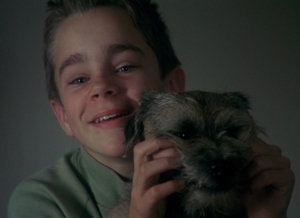
In Swedish with English subtitles
Set in Sweden in 1958-1959, My Life as a Dog follows the growing pains of 12-year-old boy named Ingemar (Anton Glanzelius), who is separated from his older brother and sent to live with relatives when his mother becomes ill. The premise is classic arthouse hit of the week material, but this one really cuts close to the bone, tossing and turning through its hero’s adolescence, painfully awkward and filled with wonder. The supporting cast, made up of child actors and eccentric adults, feels like a real family. Director Lasse Hallström, then most famous for directing nearly all of ABBA’s music videos, and probably best known to US audiences for What’s Eating Gilbert Grape, earned a Best Director and a Best Adapted Screenplay Academy Award nomination for the film in 1988 upon its belated stateside release, a relatively rare feat for a work of foreign cinema. My Life as a Dog was a favorite of Kurt Vonnegut, who said it “made me like life and human beings much more than I had ever done before. Quite a favor!” (JA)
101 min • FilmTeknik • 35mm from CFS Collections, Permission Janus
Cartoon: “Crazy Mixed-Up Pup” (Tex Avery, 1954) – 7 min – 16mm
Wednesday, October 10 @ 7:30 PM / NEIU
TRUCK TURNER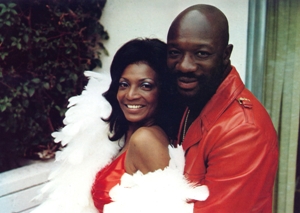
Directed by Jonathan Kaplan • 1974
“He’s a skip tracer, the last of the bounty hunters, living on blood money and borrowed time.” A paunchy studio rat whose cinema bonafides were previously limited to soundtrack work, Isaac Hayes improbably proved the perfect anchor to one of the wildest films to come out of the ’70s Black action movie boom. Hayes stars as the most indelibly named title character this side of Foxy Brown, an ex-football player turned skip tracer who specializes in taking the dirtiest cases for the biggest payouts. Chockablock with unrelenting action setpieces capable of giving any poliziotteschi a run for its money and set to an infectious, horn-laden score by Hayes that actually bests his Oscar-feted work on Shaft, Truck Turner renders the urban action thriller as comic book tableau, where bounty hunters and pimps battle for primacy in a Los Angeles that’s all weed-stricken vacant lots, gaudy mini-mansions, and molten pavement stretching in every direction. For everything larger than life about Truck Turner, Hayes cuts a refreshingly grounded figure, a spiritual sibling to Elliot Gould’s schlubby private dick in the previous year’s The Long Goodbye. Even the baddest mothers have to deal with their cats peeing on their stuff. (CW)
Film Stock: Kodak LPP (1983 ✖▲✖)
91 min • American International Pictures • 35mm from Park Circus
Preceded by: AIP Trailer Reel
Sunday, October 14 @ 5:00 PM / Music Box Theatre
SAPPHO
Directed by Dimitri Buchowetzki • 1921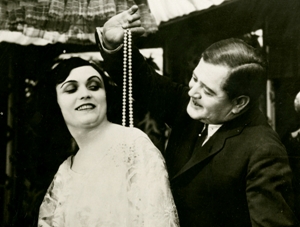
Live accompaniment by Music Box house organist Dennis Scott
Fresh from the worldwide success of Ernst Lubitsch’s Madame DuBarry, Polish actress Pola Negri signed a contract with Paramount Pictures to great fanfare. In March 1923, a month before the release of Negri’s first American film, with newspaper headlines speculating on a love affair with Charles Chaplin, Goldwyn Studios dusted off one of her unreleased German films from two years earlier, retitled it Mad Love, and cannily exploited the public’s mounting Negri-mania. (Negri was literally the entire show, as the studio didn’t bother to advertise the rest of the cast and barely acknowledged the director, Dimitri Buchowetzki, who had recently helmed an acclaimed adaptation of Othello with Emil Jannings.) Described by the New York Tribune as “the greatest non-stop vamping record ever filmed,” Sappho follows Negri as the titular temptress who drives one lover to the insane asylum (Alfred Abel), proceeds to seduce his brother (Johannes Riemann), beguiles an automobile magnate (Albert Steinrück), and more. A mad whirl of betrayal and revenge follows. Long neglected, Sappho has been preserved by UCLA Film & Television Archive from multi-tinted nitrate copy with English intertitles from the MGM library. (KW)
81 min • Projektions-AG Union • 35mm from UCLA Film & Television Archive
Cartoon: Felix the Cat in “Comicalamities” (Otto Messmer, 1928) – 8 min – 16mm
Wednesday, October 17 @ 7:30 PM / NEIU
THE COLOR OF MONEY
Directed by Martin Scorsese • 1986
“You gotta be a student of human moves.” 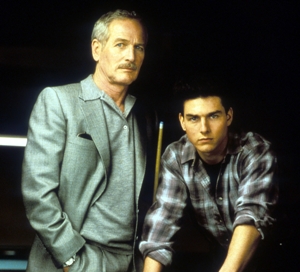 Screenwriter Richard Price might well have been describing himself when he penned this pearl for Paul Newman’s iconic “Fast Eddie” Felson – just one of his many fired-off salvos of hard-won wisdom that seem to fly right over the head of meathead protégé Vincent Lauria (Tom Cruise). Charged with drafting a sequel to 1961’s The Hustler, Price reportedly threw out the source material (Walter Tevis’s follow-up novel and his own screenplay adaptation), dusted off a familiar sports-movie premise, and managed somehow to whip up a highly amusing, tightly wound film bursting with fresh insights on the human condition. The plot: Fast Eddie, two-and-a-half decades removed from his bitter straight-pool triumph over Minnesota Fats, now sits around grousing about the new generation of “bangers” who achieve cheap successes in televised nine-ball tournament play. After discovering the cocky young Vincent, though, he can’t help but salivate at the prospect of another shot at green-felt immortality, so it’s time to hit the road, stopping in every rundown Rust Belt poolroom they can find. (Chicago plays itself, along with Atlantic City and several other gritty locales.) Along for the ride is Mary Elizabeth Mastrantonio as Vincent’s girlfriend Carmen, frequently getting caught in the middle as the shooters’ partnership quickly curdles into a rivalry. Plus, how about a moody, time-capsule-worthy score by The Band’s Robbie Robertson and a scene-stealing cameo by a young Forest Whitaker? And now there’s barely time to mention the fun and flashy direction by a middle-period Scorsese (flirting amiably with self-parody a decade before showing signs of full congealment), abetted by the restless and resplendent cinematography of occasional collaborator (and Fassbinder fave) Michael Ballhaus. Rack ’em. (GW)
Screenwriter Richard Price might well have been describing himself when he penned this pearl for Paul Newman’s iconic “Fast Eddie” Felson – just one of his many fired-off salvos of hard-won wisdom that seem to fly right over the head of meathead protégé Vincent Lauria (Tom Cruise). Charged with drafting a sequel to 1961’s The Hustler, Price reportedly threw out the source material (Walter Tevis’s follow-up novel and his own screenplay adaptation), dusted off a familiar sports-movie premise, and managed somehow to whip up a highly amusing, tightly wound film bursting with fresh insights on the human condition. The plot: Fast Eddie, two-and-a-half decades removed from his bitter straight-pool triumph over Minnesota Fats, now sits around grousing about the new generation of “bangers” who achieve cheap successes in televised nine-ball tournament play. After discovering the cocky young Vincent, though, he can’t help but salivate at the prospect of another shot at green-felt immortality, so it’s time to hit the road, stopping in every rundown Rust Belt poolroom they can find. (Chicago plays itself, along with Atlantic City and several other gritty locales.) Along for the ride is Mary Elizabeth Mastrantonio as Vincent’s girlfriend Carmen, frequently getting caught in the middle as the shooters’ partnership quickly curdles into a rivalry. Plus, how about a moody, time-capsule-worthy score by The Band’s Robbie Robertson and a scene-stealing cameo by a young Forest Whitaker? And now there’s barely time to mention the fun and flashy direction by a middle-period Scorsese (flirting amiably with self-parody a decade before showing signs of full congealment), abetted by the restless and resplendent cinematography of occasional collaborator (and Fassbinder fave) Michael Ballhaus. Rack ’em. (GW)
119 min • Touchstone Pictures • 35mm from Disney, permission Swank
Short: W.C. Fields in “Pool Sharks” (Edwin Middleton, 1915) – 10 min – 35mm
Wednesday, October 24 @ 7:30 PM / NEIU
TO BE OR NOT TO BE
Directed by Ernst Lubitsch • 1942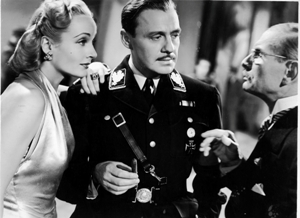
Joseph Goebbels is seemingly the only cinephile to proffer an active distaste for Ernst Lubitsch. While the Nazi propaganda minister was launching attacks on the director through anti-Semitic “documentaries” in Europe, Lubitsch, firmly ensconced in Hollywood, mounted one of the great farces of the era, positing that National Socialism could be easily outwitted by a bunch of scenery-chewing hams. Jack Benny stars as Josef Tura, the leader of a theatrical troupe in 1939 Warsaw, recently invaded by Germany. When Tura’s wife Maria (Carole Lombard, brilliant in her final role) becomes embroiled with a Polish resistance fighter (a dreamy Robert Stack), she comes under scrutiny from local Nazi leadership and Josef and company must concoct a series of ruses to free her and protect Warsaw’s underground resistance. Never stooping to self-congratulation or sentimentality, To Be or Not to Be found Lubitsch at the peak of his artistry, landing every single punchline with aplomb and with nary a mawkish moment nor wasted breath to be found in between. That Lubitsch managed all of this while addressing the impending threat of global fascist takeover makes his achievement all the more remarkable. As a character in the film says, “A laugh is nothing to be sneezed at.” (CW)
99 min • United Artists • 35mm from Westchester Films
Cartoon: “Betty Boop’s Prize Show” (Fleischer Brothers, 1934) 8 min – 16mm
Saturday, October 27 @ 11:00 AM
HOME MOVIE DAY 2018
Presented by the Chicago Film Society and Chicago Film Archives.
Chicago History Museum, 1601 N. Clark Street • Free Admission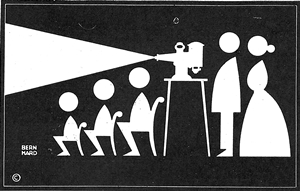
Go down to the basement and dig out your Super 8 memories of that interminable trip to Idaho or that embarrassing 16mm footage of your mother’s rockin’ bat mitzvah and bring them to the Chicago History Museum on Saturday, October 27 for this year’s edition of Home Movie Day. Jointly presented for the eighth year in a row by Chicago Film Archives and the Chicago Film Society, Home Movie Day offers Chicagoans the opportunity to gather together and share their celluloid histories. Home movies provide invaluable records of our families and our communities: they document vanished storefronts, questionable fashions, adorable pets, long-departed loved ones, and neighborhoods-in-transition. Many Chicagoans still possess these old reels, passed down from generation to generation, but lack the projection equipment to view them properly and safely. That’s where Home Movie Day comes in: you bring the films, and we inspect them, project them, and offer tips on storage, preservation, and video transfer–all free of charge. And best of all, you get to watch them with an enthusiastic audience, equally hungry for local history.
Wednesday, October 31 @ 7:30 PM / NEIU
NIGHT OF THE DEMON
Directed by Jacques Tourneur • 1957
“I make films on the supernatural,” Jacq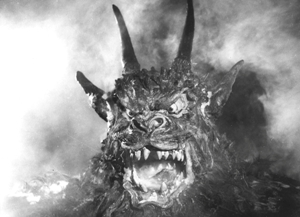 ues Tourneur once admitted, “and I make them because I believe in it.” Tourneur’s American career took off with a trio of stylish and suggestive horror films for RKO producer Val Lewton (Cat People, I Walked with a Zombie, and The Leopard Man), but he didn’t return to the genre again until his stature in the industry had seriously eroded in the late 1950s. Yet Night of the Demon is not the film of an artist on the ropes, but instead a finely calibrated, highly personal, and intellectually rigorous work to stand beside Tourneur’s best. Written by Hitchcock’s go-to scripter Charles Bennett, Night of the Demon dramatizes the conflict between scientific rationalism and ancient superstition with uncommon nuance and sensitivity. Dana Andrews stars as self-styled American myth-buster John Holden, who journeys to England to investigate and debunk rumors of a demon loose in the countryside. When a colleague turns up dead, Holden finds himself drawn into the occult underworld of magician, hypnotist, and occasional birthday clown Niall MacGinnis, who remains one of the most simultaneously sinister and sympathetic villains the genre has yet bequeathed. The producer showed more of the demon than Tourneur considered strictly necessary and lopped off thirteen minutes for the retitled American version, Curse of the Demon, but nothing can diminish the satanic majesty conjured in the marsh. (KW)
ues Tourneur once admitted, “and I make them because I believe in it.” Tourneur’s American career took off with a trio of stylish and suggestive horror films for RKO producer Val Lewton (Cat People, I Walked with a Zombie, and The Leopard Man), but he didn’t return to the genre again until his stature in the industry had seriously eroded in the late 1950s. Yet Night of the Demon is not the film of an artist on the ropes, but instead a finely calibrated, highly personal, and intellectually rigorous work to stand beside Tourneur’s best. Written by Hitchcock’s go-to scripter Charles Bennett, Night of the Demon dramatizes the conflict between scientific rationalism and ancient superstition with uncommon nuance and sensitivity. Dana Andrews stars as self-styled American myth-buster John Holden, who journeys to England to investigate and debunk rumors of a demon loose in the countryside. When a colleague turns up dead, Holden finds himself drawn into the occult underworld of magician, hypnotist, and occasional birthday clown Niall MacGinnis, who remains one of the most simultaneously sinister and sympathetic villains the genre has yet bequeathed. The producer showed more of the demon than Tourneur considered strictly necessary and lopped off thirteen minutes for the retitled American version, Curse of the Demon, but nothing can diminish the satanic majesty conjured in the marsh. (KW)
95 min • Associated British Picture Corp. • 35mm from Sony Pictures Repertory
Film Stock: Kodak B+W (1999)
Preceded by: 1950s Horror Trailer Reel
Saturday, November 3 @ 7:30 PM / Chicago Filmmakers
Unsentimental Education: Classroom Films by Barbara Loden and John Mackenzie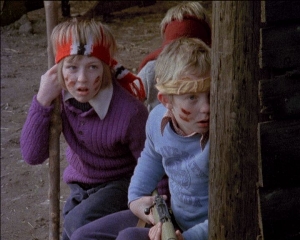
Nostalgic reflections of youthful hours whiled away in palatial movie houses are all fine and good, but for many a generation cinephilia blossomed in the classroom under the auspices of cheap little films shown during rare reprieves between geography and math. While not all classroom films are created equal, many of these unheralded wonders were made by filmmakers with real talent, and a lot of these films left marks that lasted into adulthood. We’re bringing you a selection of some of the best, courtesy of two bonafide auteurs who found a creative outlet in the educational market in lean years when funding for features was scarce. Faced with public indifference following the release of her American independent classic Wanda, Barbara Loden began directing for the Learning Corporation of America and made two desolate, masterful approximations of New Hollywood aesthetics for the junior set: survivalist Western The Frontier Experience and harrowing JD parable The Boy Who Liked Deer (both 1975). Meanwhile in England, The Long Good Friday director John Mackenzie made a name for himself in the British public information film market, where in 1977 he directed the Ten Little Indians-aping farm safety short Apaches, perhaps the most traumatic film ever made ostensibly for children. We’ll be giving these films a rare theatrical presentation, so be sure you don’t cut class this week! (CW)
Approx run time 70 min • 16mm from Chicago Film Society Collections, Chicago Film Archives, and BFI National Archive
Monday, November 12 @ 7:00 PM / Music Box Theatre
MIKEY AND NICKY
Directed by Elaine May • 1976
Riding high on the critical and commerci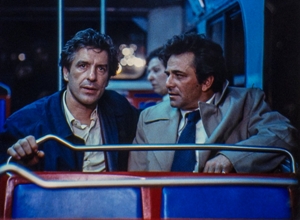 al success of The Heartbreak Kid, Elaine May was given the chance to write and direct a gangster story she’d been contemplating for two decades. Shot in the scuzziest and least brotherly corners of Philadelphia and steeped in the desiccated dreams of its low-level hoodlums, Mikey and Nicky emerged as a decidedly unromantic addition to the genre. Nicky (John Cassavetes) owes a small sum to the mafia and turns to his childhood friend Mikey (Peter Falk) to find the light at the end of the tunnel. In keeping with the rambling, low-key vibe, even the hired gun tracking them down (Ned Beatty) looks more like a cheesed-off storefront accountant than a fearsome assassin. May is an acute observer of tiresome masculinity and keeps Mikey and Nicky moving sideways towards its sad-sack, seemingly inevitable conclusion. After two years of editing, Paramount soured on May’s free-spending ways (over a million feet of film had been exposed during production) and gave a compromised version of Mikey and Nicky a cursory theatrical release. Comedian and May admirer Patton Oswalt memorably summed up the rest of the story: “She stole the print from the studio, hid it in her garage like a punk-fucking-rocker, and stared the studio down to put out the version she wanted. Avert your gaze as she passes by! That’s Elaine May, goddammit!” (KW)
al success of The Heartbreak Kid, Elaine May was given the chance to write and direct a gangster story she’d been contemplating for two decades. Shot in the scuzziest and least brotherly corners of Philadelphia and steeped in the desiccated dreams of its low-level hoodlums, Mikey and Nicky emerged as a decidedly unromantic addition to the genre. Nicky (John Cassavetes) owes a small sum to the mafia and turns to his childhood friend Mikey (Peter Falk) to find the light at the end of the tunnel. In keeping with the rambling, low-key vibe, even the hired gun tracking them down (Ned Beatty) looks more like a cheesed-off storefront accountant than a fearsome assassin. May is an acute observer of tiresome masculinity and keeps Mikey and Nicky moving sideways towards its sad-sack, seemingly inevitable conclusion. After two years of editing, Paramount soured on May’s free-spending ways (over a million feet of film had been exposed during production) and gave a compromised version of Mikey and Nicky a cursory theatrical release. Comedian and May admirer Patton Oswalt memorably summed up the rest of the story: “She stole the print from the studio, hid it in her garage like a punk-fucking-rocker, and stared the studio down to put out the version she wanted. Avert your gaze as she passes by! That’s Elaine May, goddammit!” (KW)
119 min • Paramount Pictures • 35mm from Julian Schlossberg
Short: “Where It All Began: Philadelphia” (Michael E. Smith, 1975) – 10 min – 16mm
Saturday, November 17 @ 11:30 AM / Music Box Theatre
STREET ANGEL
Directed by Frank Borzage • 1928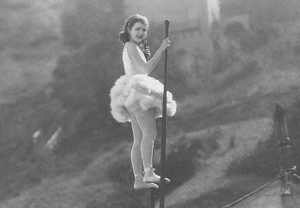
Live accompaniment by Music Box house organist Dennis Scott
Auteurist critics who rediscovered the work of Frank Borzage in the 1970s grasped for superlatives, but none fashioned as succinct a thesis statement as the opening titles of Street Angel, perhaps the director’s best silent effort: “Everywhere … in every town … in every street … we pass unknowing human souls made great by love and adversity.” The beatification of common people with everyday problems reaches a resplendent apex in Street Angel, in which Neapolitan urchin Angela (Janet Gaynor) turns amateur streetwalker after her mother falls ill. Fleeing the police, she joins a gypsy circus and meets romantic painter Gino (Charles Farrell). When the authorities finally catch up with the lovers, Gino’s portrait of Angela becomes a transcendent conduit for two souls blooming in adversity’s shadow. A follow-up to the Borzage/Gaynor/Farrell smash 7th Heaven, with a heavy helping of Expressionist visual finesse creatively cribbed from Fox’s star director F.W. Murnau, Street Angel is the rare popular success whose appeal is still readily apparent ninety years on. That potential was not always evident: Ernest Palmer’s highly diffused, near-ineffable cinematography was initially rejected by the Fox lab as unprintable, but luckily more poetic heads prevailed. (KW)
102 min • Fox Film Corp • 35mm from Fox Library Services
Short: “Rain” (Joris Ivens, 1929) – 12 min – 16mm
Wednesday, November 21 @ 7:30 PM / NEIU
SONG OF THE OPEN ROAD
Directed by S. Sylvan Simon • 1944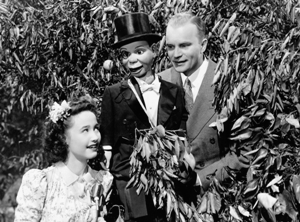
Hollywood’s ode to child labor if there ever was one, Song of the Open Road stars teen actress Jane Powell (playing teen actress “Jane Powell”), who takes leave of an overbearing stage mother (Joseph Cornell’s own Rose Hobart) and a studio system intent on monopolizing her time and energy to find excitement and adventure picking lima beans for the USDA’s Crop Corps, a wartime effort to enlist teenagers to fill farm work vacancies. A regular Celine or Julie, Jane (disguised in a dyed brown bob as “Jane”) is fast enthralled observing her fellow teens in romantic roundelay and meanwhile mills around the edges of their dime store dramas, inadvertently bungling the tasks she volunteers for and mussing up the routines of the young pickers she has fallen in with. An easygoing meta-musical comedy pitched as Department of Agriculture propaganda, Song of the Open Road is a film that features an unmotivated and unconvincing archeology-themed ventriloquist routine, a musical number about date crops performed atop bicycles, and a gloriously besotted W.C. Fields cameo. In other words, it’s a film you will only see at the Chicago Film Society. (CW)
93 min • Charles R. Rogers Productions • 35mm from private collections
Short: “Hit and Rum” (Ben Holmes, 1935) – 20 min – 35mm
Monday, November 26 @ 7:00 PM / Music Box Theatre
YI YI
Directed by Edward Yang • 2000
In Mandarin with English subtitles
Maybe no film can encompass all of human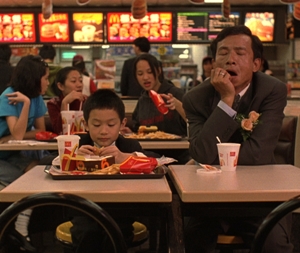 experience, but it’s remarkable just how much of it is in Yi Yi: a birth, a funeral, a wedding, a first date, near-death episodes, breakups, reconciliations, corporate intrigue, generational ennui, and the inscrutable actions of the most precocious young photographer in Taiwan. Detailing a stream of quotidian ordeals large and small in an extended family living in Taipei, Edward Yang’s epic consanguineal saga alternates between the lives of its ensemble as they come together and pull apart between major life events: patriarch NJ, a hangdog salary man in the midst of a midlife crisis; daughter Ting-Ting, in the blush of first love; son Yang-Yang, an outsider at school; newly married uncle A-Di, incapable of managing life as a family man; mother Min-Min, coming to terms with the approaching death of her own mother. The closest Yang ever came to crossover arthouse success in the United States, Yi Yi found a broader audience and greater critical acclaim than any of the director’s earlier pictures due in no small part to its tempering of the still-present bitterness that flavors all of Yang’s films with a heaping of tender comedy. Yi Yi would be Yang’s last film (he died of cancer in 2007), but through it he achieved the success that so often eluded his characters and gifted us one of the greatest films this young century has yet seen. The victim of limited print availability and fickle US distribution courtesy of arthouse villains best left unnamed, Yi Yi finally returns to Chicago for the first time since its premiere run at the Music Box Theatre for a special one-time-only screening in an archival 35mm print. (CW)
experience, but it’s remarkable just how much of it is in Yi Yi: a birth, a funeral, a wedding, a first date, near-death episodes, breakups, reconciliations, corporate intrigue, generational ennui, and the inscrutable actions of the most precocious young photographer in Taiwan. Detailing a stream of quotidian ordeals large and small in an extended family living in Taipei, Edward Yang’s epic consanguineal saga alternates between the lives of its ensemble as they come together and pull apart between major life events: patriarch NJ, a hangdog salary man in the midst of a midlife crisis; daughter Ting-Ting, in the blush of first love; son Yang-Yang, an outsider at school; newly married uncle A-Di, incapable of managing life as a family man; mother Min-Min, coming to terms with the approaching death of her own mother. The closest Yang ever came to crossover arthouse success in the United States, Yi Yi found a broader audience and greater critical acclaim than any of the director’s earlier pictures due in no small part to its tempering of the still-present bitterness that flavors all of Yang’s films with a heaping of tender comedy. Yi Yi would be Yang’s last film (he died of cancer in 2007), but through it he achieved the success that so often eluded his characters and gifted us one of the greatest films this young century has yet seen. The victim of limited print availability and fickle US distribution courtesy of arthouse villains best left unnamed, Yi Yi finally returns to Chicago for the first time since its premiere run at the Music Box Theatre for a special one-time-only screening in an archival 35mm print. (CW)
173 min • Atom Films • 35mm from Yale Film Archive, permission Janus
Short: “Duermete Ninita” (Thad Povey, 1994) – 6 min – 16mm
Wednesday, December 5 @ 7:30 PM / NEIU
LAUGHTER IN HELL
Directed by Edward L. Cahn • 1933
A rising, visionary director at Universal 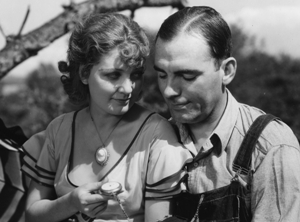 Pictures in the early years of the Great Depression and later subject of cult appreciation, Edward L. Cahn unceremoniously disappeared from the studio’s roster in 1933, relegated to poverty row cheapies and Our Gang shorts for the remainder of his filmmaking days. That year saw the release of his final picture for the studio, the explosive, controversial chain gang drama Laughter in Hell, an archetypal film maudit transgressive enough to end even the most illustrious career. An adaptation of hobo-writer Jim Tully’s novel of the same name, Laughter in Hell follows the tribulations of train engineer Barney (Pat O’Brien), who flies into a homicidal rage after discovering his wife has been carrying on an affair with his childhood nemesis and winds up sentenced to a lifetime of hard labor. Barney’s time on the chain gang provides grist for one of the most hellacious passages in American cinema, wherein the inmate witnesses horrors of pestilence and abuse, including an act of racially motivated violence that put the film in the crosshairs of local censorship boards discomfited by its indictment of institutional corruption. Little seen since its initial release and reported lost for years, Universal has finally unleashed Laughter in Hell from the vault in a recently struck 35mm print to stun audiences anew. (CW)
Pictures in the early years of the Great Depression and later subject of cult appreciation, Edward L. Cahn unceremoniously disappeared from the studio’s roster in 1933, relegated to poverty row cheapies and Our Gang shorts for the remainder of his filmmaking days. That year saw the release of his final picture for the studio, the explosive, controversial chain gang drama Laughter in Hell, an archetypal film maudit transgressive enough to end even the most illustrious career. An adaptation of hobo-writer Jim Tully’s novel of the same name, Laughter in Hell follows the tribulations of train engineer Barney (Pat O’Brien), who flies into a homicidal rage after discovering his wife has been carrying on an affair with his childhood nemesis and winds up sentenced to a lifetime of hard labor. Barney’s time on the chain gang provides grist for one of the most hellacious passages in American cinema, wherein the inmate witnesses horrors of pestilence and abuse, including an act of racially motivated violence that put the film in the crosshairs of local censorship boards discomfited by its indictment of institutional corruption. Little seen since its initial release and reported lost for years, Universal has finally unleashed Laughter in Hell from the vault in a recently struck 35mm print to stun audiences anew. (CW)
70 min • Universal Pictures • 35mm from Universal
Feature Film Stock: Kodak B+W Polyester (2003)
Short: “A Burglar to the Rescue” (George Cochrane, 1931) – 18 min – 35mm from Universal
Short Film Stock: Kodak B+W Acetate (1999)
Monday, December 10 @ 7:00 PM / Music Box Theatre
FORTY GUNS
Directed by Samuel Fuller • 1957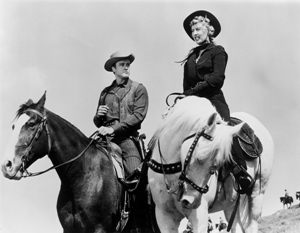
As budgets and screens swelled in tandem in the 1950s, bread-and-butter genre pictures like musicals and westerns became bigger, louder, and safer. The exception that proves the rule: Samuel Fuller’s Forty Guns, a propulsive, devil-may-care Western shot in black-and-white Cinemascope in two weeks, complete with Jidge Carroll singing the ballad of “The Woman with the Whip” to a gaggle of men bathing in a sagebrush spa. Barbara Stanwyck stars as Jessica Drummond, the Tombstone titan who commands as many thieves as Ali Baba. Her central conflict—protecting her ne’er-do-well brother (John Ericson) or giving it all up for the ex-gunslinger she comes to love (Barry Sullivan)—may sound rote, but the execution and emotional nuance are anything but. The overall attitude owes something to other proto-feminist westerns of the era, such as The Woman They Almost Lynched and Johnny Guitar, but the melancholy/mercenary savoir faire is specifically, spectacularly Stanwyck. As an independent producer contracted with 20th Century-Fox, Fuller enjoyed an unusual degree of creative freedom, staging elaborate dolly-shot excavations of Tombstone storefronts with a gusto that any studio chief would’ve found alarming. Still, Fuller’s experience was not without some compromise; as he complained in his posthumous autobiography, “For Chrissakes, my gunman had to think about box office receipts before pulling the trigger.” (KW)
80 min • Globe Enterprises • 35mm from 20th Century Fox
Film Stock: Eastman B+W (1996)
Cartoon: “Wild and Woolfy” (Tex Avery, 1945) – 8 min – 16mm
Saturday, December 15 @ 7:30 PM / Chicago Filmmakers
MARY JANE’S NOT A VIRGIN ANYMORE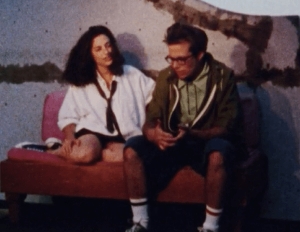
Directed by Sarah Jacobson • 1996
After hawking VHS copies of her short film “I Was a Teenage Serial Killer” at ’zine conventions across the U.S. of A., self-proclaimed “Queen of Underground Cinema” Sarah Jacobson catapulted to DIY stardom with her first and only feature, Mary Jane’s Not a Virgin Anymore—or, as the film’s original website put it, “the 23-year-old Jacobson is back IN YOUR FACE with an explosive look at girls having sex and what they have to say about it.” Produced and self-distributed by Jacobson and her mother, Mary Jane chronicles the sexual travails of a high schooler (Lisa Gerstein) who works with punks, drunks, and losers at her local indie cinema, with San Francisco’s Victoria Theatre standing in for the generic, no-frills Midwestern art houses of Jacobson’s youth. The sex talk is as explicit and hilarious as you would expect from this fearless disciple of George Kuchar—and if that wasn’t enough, Jello Biafra of the Dead Kennedys puts in a cameo. Mary Jane debuted at the 1996 edition of the Chicago Underground Film Festival and went on to play Sundance and numerous festivals around the world. “Out in the real world,” Variety condescendingly noted in its Park City dispatch, “Mary Jane will be lucky to find midnight dates in small college-town cinemas,” but anyone who’s been tasked with cleaning the popcorn machine after hours will instantly relate. (KW)
98 min • Station Wagon Productions • 16mm from Canyon Cinema
Film Stock: Kodak 386 (Polyester, 1997) Lab: FotoKem
Short: “I Want a Clean Cinema” (Doc Films, c. 1999) – 16mm – 1 min
Special Thanks: Shayne Pepper, Michael Hines, Kyle Burke, Cyndi Moran, Robert Ritsema, Ernie Kimlin, Chris Rodriguez, Tom Scanlon, & Asher Waldron of Northeastern Illinois University; Brian Andreotti & Ryan Oestreich of the Music Box Theatre; Brenda Webb, Sophie Mannaerts, & Patrick Friel of Chicago Filmmakers; Randy Andrews of Swank Motion Pictures; David Antos & Chris Omiotek; Mark Balsam of Westchester Films; Brian Belovarac & Ben Crossley-Marra of Janus Films; Cassie Blake, May Haduong, & Charles Rogers of the Academy Film Archive; James Bond of Full Aperture Systems; Antonella Bonfanti and Seth Mitter of Canyon Cinema; Jiayi Chen; Dennis Chong, Jesse Chow, Liam Berney, Jason Jackowski, & Eric Chin of Universal; Chris Chouinard of Park Circus; Neil Cooper; Steve Darnall; Justin Dean; Justin Dennis of Kinora; Eric DiBernardo & Dave Franklin of Rialto Pictures; Bill Francik; Eric Grayson; Katherine Greenleaf; Cary Haber of Criterion Pictures, USA; David Jennings of Sony Pictures Repertory; Stephany Kim of Fox Library Services; James Layton of the Museum of Modern Art; Steven Lloyd; Steven Lucy; Irmi Maunu-Kocian of the Goethe-Institut Chicago, Brian Meacham of Yale Film Archive; Bob Morrissey; Kristie Nakamura & Nicole Woods of Warner Bros. Classics; Scott Norwood; Hannah Prouse of the BFI; Mike Quintero; Dennis Scott; Lynanne Schweighofer, Rob Stone, & Mike Mashon of the Library of Congress; Julian Schlossberg; Tommy Jose Stathes; Victoria Stevenson and Christy Elder of Twentieth Century Fox; Jack Theakston; Kiyan Warner; Nancy Watrous, Brian Belak, & Michelle Puetz of Chicago Film Archives; and Todd Wiener & Steven K. Hill of UCLA Film & Television Archive
And extra special thanks to our audience, who make it all possible!
